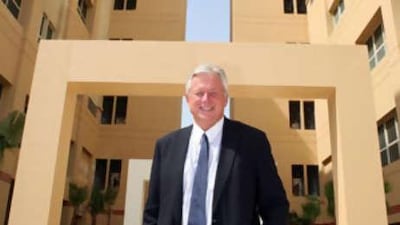The number of graduates from universities in Dubai's free zones must increase from 10,000 to 40,000 to help the economy grow, the emirate's head of higher education said. There also needs to be more foreign university branch campuses to give graduates skills that are relevant to the economy, said Dr Warren Fox, director of higher education at the Knowledge and Human Development Authority. "We need more branch campuses and we need more variety. We want a range of public and private institutions, we want a range of small and large institutions and we want to give opportunities to Emiratis and expatriates," said Dr Fox.
"The UAE has had a record of importing educated talent, but Dubai is diversifying its economy. It's building a knowledge-driven economy. There are areas, such as trade, logistics and construction, where large numbers of graduates are needed." Dr Fox said quadrupling the number of graduates over the next decade would provide businesses with enough qualified staff as the emirate's economy grows in line with the Dubai Strategic Plan 2015.
Dubai's main education free zones, Dubai International Academic City (DIAC) and Dubai Knowledge Village, have 26 higher-education institutions and about 10,000 students. Expansion to 40 institutions and 40,000 students would come mostly through expansion at DIAC. Ras al Khaimah is planning a similar free zone with as many as 15 institutions and up to38,000 students. The need for qualified graduates will be especially great in health sciences, architecture and engineering, Dr Fox said.
Government departments do not accept graduates with degrees from free-zone universities, because they are not accredited by the Ministry of Higher Education and Scientific Research. Such graduates also cannot use their certificates to secure places in postgraduate courses at institutions with ministry-accredited courses. Dr Fox, chairman of the University Quality Assurance International Board, which licences Dubai's free-zone universities and ensures they maintain the standards of the parent institution, said, "We hope we can find ways to make sure quality degrees are recognised. Hopefully there will be government processes supporting the employment of these graduates."
The quality assurance board issues academic licences but, unlike the higher-education ministry's Commission for Academic Accreditation, does not accredit courses. Dr Fox is meeting with officials of that commission to determine how they can work together to resolve free-zone issues and attract more university branches. "What we are doing is a good international programme for quality assurance," Dr Fox said. "We're reviewing these campuses," he said, to ensure they offer "the same quality programmes and quality of campus as in their home institutions".
More campus branches are coming to Dubai because they can offer a quality programme that is already accredited in their home countries, he said. "We want the branch to be part of the home institution and not to change its structure and governance in any way." By February, the quality assurance board is due to have assessed and licensed all the institutions in Dubai's free zones. Generally a licence from the Knowledge and Human Development Authority certifies the same quality level as approval by the Commission for Academic Accreditation, including programme oversight, student record-keeping and examinations, Dr Fox said.
He said the quality-assurance board's practice of checking on branch campuses could become a model for other countries. "We're having a lot of positive interest from people that this could be the way of the future," he said. "There is already interest from other countries that have asked about our process." dbardsley@thenational.ae


